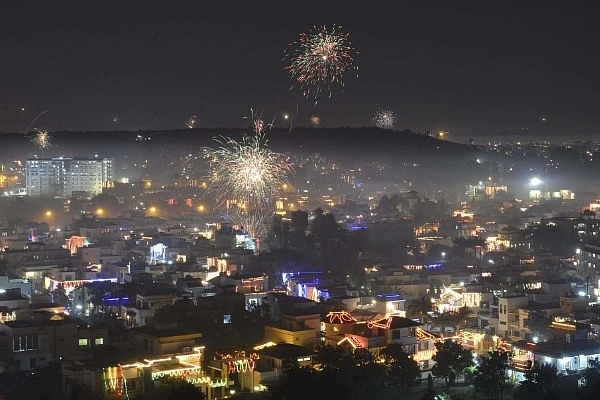Ideas
Community Pyrotechnics: A Possible Path To A Greener Deepavali
- In the Deepavali firecracker issue, prohibition won’t work. Neither will allowing firecrackers unhindered. What’s required is the middle path.

Diwali celebration over the Shahpura area in Bhopal, India. (Mujeeb Faruqui/Hindustan Times via Getty Images)
The Supreme Court, speaking respectfully, has been passing knee-jerk orders on the Deepavali crackers issue, agitating the minds of green activists. Last year, at the eleventh hour, it banned the sale of firecrackers in Delhi. This time around, it has passed a pan-India order once again as Deepavali festivities kick off, effecting the people of the country on a large scale—no lighting firecrackers except for two hours, from 8-10 pm on the Deepavali day, i.e. 7 November 2018.
That the people of Chennai celebrate Deepavali in the morning hasn’t occurred, it appears, to the apex court, which has naively or deliberately assumed India is New Delhi and New Delhi is India. It hasn’t cared for the livelihood of small-scale industries and businesses in the firecracker trade. Production starts more than six months before the Deepavali day, and it is cruel to pour cold water on their stock and morale at the last minute.
It is not as if the Supreme Court order is going to beget dutiful compliance. Far from it, there is bound to be across-the-nation defiance, not in the least because of a lack of police bundobust. Prohibition simply doesn’t work. And the forbidden fruit is always sought after with greater intensity and passion.
At the same time, the green activists have a point—most firecrackers are toxins and they poison the air, much to the agony of patients with weak lungs, besides weakening the lungs of the more healthy. The solution lies in bringing about order in Deepavali celebrations with firecrackers because asking people to be content with lighting diyas is as inane and puerile as asking Hindus to be content with a large hospital or educational institution at the Rama janmabhoomi (birthplace).
But the Supreme Court can take a leaf out of the United States’ book. Pyrotechnics are allowed in that country with necessary permissions and safeguards. Yours truly had the good fortune of witnessing pyrotechnics organised by the University of North Carolina on 4 July, the America’s Independence Day, 2014. People were seated on two sides of a stadium, with the other two left vacant. Soon, the wisdom of this apparent waste of space dawned on us—these two sides were vulnerable because the rockets and other firecrackers going up into the sky had a trajectory that could have hurt the occupants. Safety arrangements went beyond this—four fire engines were standing inside the stadium in a state of readiness, just in case.
Hindus in the US, who constitute a sizeable part of the Indian diaspora, are similarly allowed to light firecrackers within the confines of Hindu temples, with prior permission and sufficient safeguards. The Supreme Court can urge the central government and states to emulate the US in this area.
To be sure, there may be murmurs of protests—witnessing pyrotechnics is, at best, a vicarious pleasure, and there is no substitute to lighting firecrackers in front of one’s house. But community celebrations aren’t new to the country. Durga Puja is a community celebration that takes place across the country, but especially in West Bengal.
People cannot always get exactly what they want. They may have to settle for a compromise, which, in this case, could be earmarking licensed places of celebration, like large schools, stadiums, and Hindu temples. Transportation must be arranged, and it must be foolproof. The licensees must undertake to abide by the regulations, including the non-use of polluting crackers. And they must also allow volunteers to enlist their names for the more active role of lighting crackers.
It is easier to enforce a regulation that targets a handful rather than one that targets practically the whole nation. Let us give it a shot.
Support Swarajya's 50 Ground Reports Project & Sponsor A Story
Every general election Swarajya does a 50 ground reports project.
Aimed only at serious readers and those who appreciate the nuances of political undercurrents, the project provides a sense of India's electoral landscape. As you know, these reports are produced after considerable investment of travel, time and effort on the ground.
This time too we've kicked off the project in style and have covered over 30 constituencies already. If you're someone who appreciates such work and have enjoyed our coverage please consider sponsoring a ground report for just Rs 2999 to Rs 19,999 - it goes a long way in helping us produce more quality reportage.
You can also back this project by becoming a subscriber for as little as Rs 999 - so do click on this links and choose a plan that suits you and back us.
Click below to contribute.
Latest